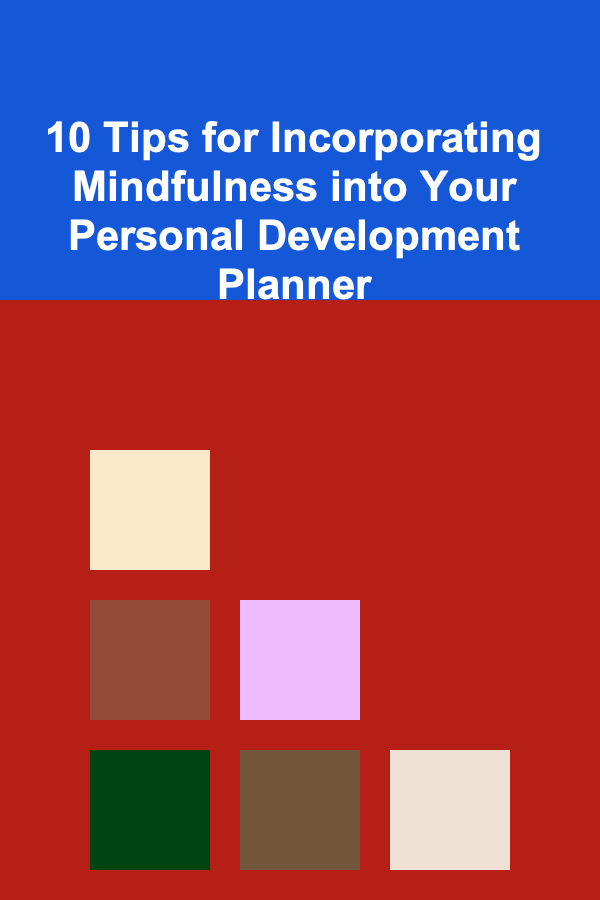
10 Tips for Incorporating Mindfulness into Your Personal Development Planner
ebook include PDF & Audio bundle (Micro Guide)
$12.99$6.99
Limited Time Offer! Order within the next:

Mindfulness has grown in popularity over the past decade as a powerful tool for reducing stress, increasing focus, and improving emotional regulation. The concept of mindfulness is simple: being present in the moment, paying attention to your thoughts and feelings without judgment, and cultivating awareness of your surroundings. When incorporated into your personal development planner, mindfulness can enhance your journey of growth by helping you make conscious choices, align your actions with your values, and foster a deeper sense of self-awareness.
This article provides 10 practical tips for incorporating mindfulness into your personal development planner to help you stay grounded, focused, and intentional about your growth.
Start Each Day with a Mindful Morning Routine
Your morning sets the tone for the rest of the day, and starting it mindfully can positively influence your mood, energy levels, and overall productivity. A mindful morning routine involves setting aside time for activities that help you center yourself before diving into the demands of the day. Here are some mindful activities to include:
- Breathing exercises: Take a few moments to focus on your breath, inhale deeply, and exhale slowly. This helps activate the parasympathetic nervous system, which reduces stress and increases focus.
- Gratitude journaling: Write down three things you're grateful for. This practice shifts your mindset toward appreciation and positivity.
- Mindful movement: Engage in light stretching or yoga to connect with your body and promote a sense of calm.
- Intentions for the day: Reflect on the day ahead and set a mindful intention, such as "I will stay focused on my priorities" or "I will approach challenges with patience."
Including mindful activities in your morning routine helps you cultivate a sense of peace and intention, setting the stage for a productive and fulfilling day.
Use a Mindfulness-Based Time Blocking System
One of the biggest challenges people face when pursuing personal development is managing time effectively. Time blocking is a method that involves dividing your day into chunks of time dedicated to specific tasks. When you integrate mindfulness into time blocking, you ensure that each time block is focused and intentional, rather than a mechanical task to tick off a list.
- Mindful planning: At the start of the week or day, take time to plan out your schedule and decide which activities deserve your full attention.
- Single-tasking: During each time block, commit to focusing on one task at a time. Avoid multitasking, as it can divide your attention and decrease the quality of your work.
- Check-in moments: Set a timer to remind yourself to pause for a few seconds during your time block. Close your eyes, take a deep breath, and check in with how you're feeling mentally and emotionally.
Time blocking with mindfulness ensures that you approach each task with clarity and purpose, rather than rushing through your day or becoming overwhelmed by distractions.
Set Intentions for Personal Growth and Mindfulness
Instead of only setting goals in your planner, consider setting intentions. Intentions differ from goals in that they are more about the mindset or attitude you want to cultivate, rather than a specific outcome. Mindful intentions help you stay present and open to the process of personal growth, rather than obsessing over achieving external markers of success.
- Reflect on your core values: Identify the qualities or principles that matter most to you, such as kindness, compassion, or resilience. Use these values as a guide when setting intentions.
- Practice self-compassion: When challenges arise, remind yourself that growth is a journey, not a destination. Be kind to yourself and embrace setbacks as opportunities to learn.
- Focus on the process, not just the result: For example, instead of setting a goal like "I will lose 10 pounds," set an intention like "I will nourish my body with healthy foods and move with joy."
By setting mindful intentions, you move away from a rigid, results-driven approach to growth and embrace the beauty of the present moment as you work toward your aspirations.
Incorporate Reflection into Your Personal Development Planner
Reflection is a critical aspect of mindfulness that helps you gain insight into your thoughts, actions, and emotions. Taking time to reflect on your progress, challenges, and successes allows you to learn from your experiences and adjust your approach as needed.
- End-of-day reflection: Each evening, spend a few minutes reviewing your day. What went well? What could you have done differently? How did you respond to challenges? This helps you develop self-awareness and mindfulness of your actions.
- Weekly check-ins: At the end of each week, take a longer period to review your accomplishments and areas for improvement. Reflect on how you aligned with your intentions and values.
- Journaling: Use your personal development planner to write about your feelings, insights, and any breakthroughs or challenges you've encountered. Journaling can be an excellent tool for processing your experiences mindfully.
Regular reflection helps you stay aware of your progress, encourages self-compassion, and fosters a growth-oriented mindset.
Practice Mindful Decision-Making
Making decisions---whether small or large---can be stressful, especially when there are multiple options or uncertainties involved. Mindfulness can support your decision-making process by helping you slow down, listen to your inner guidance, and approach choices with clarity and calmness.
- Pause before reacting: Before making a decision, pause and take a few deep breaths. Give yourself space to reflect on the decision rather than rushing into it.
- Identify your values: Consider how your decision aligns with your core values and long-term goals. Will it bring you closer to your personal development aspirations?
- Avoid overthinking: Trust your intuition and avoid getting caught up in excessive analysis. Mindful decision-making encourages you to trust the present moment and your inner wisdom.
Mindfulness helps you navigate decisions more consciously, reducing anxiety and supporting the alignment of your actions with your true self.
Prioritize Self-Care and Rest
Mindfulness isn't just about working harder or achieving more---it's also about taking care of your body and mind. Rest and self-care are essential components of personal development and should be prioritized in your planner.
- Schedule time for relaxation: Block out time for activities that promote relaxation and recovery, such as taking a bath, reading, or meditating.
- Mindful rest: During your rest periods, allow yourself to fully unwind. Avoid distractions like phones or screens. Simply focus on the present moment and enjoy the sensation of relaxation.
- Listen to your body: Pay attention to how your body feels and honor its needs for rest, nourishment, and movement.
Mindful self-care allows you to recharge and stay grounded, so you can continue pursuing personal growth with energy and balance.
Break Large Goals into Manageable Steps
Personal development often involves working toward long-term goals, which can feel overwhelming at times. Mindfulness can help you break down large goals into smaller, more achievable steps, making the process less daunting and more manageable.
- Set realistic milestones: Break your larger goals into smaller, actionable steps that you can achieve within a week or a month. This helps you stay focused and motivated.
- Focus on one step at a time: Instead of thinking about the entire goal, concentrate on the current step you're working on. This keeps you present and prevents overwhelm.
- Celebrate progress: Acknowledge your achievements along the way, no matter how small. Celebrating your progress builds positive momentum and encourages continued effort.
By breaking large goals into smaller steps, you make progress toward your personal development in a more focused and mindful way.
Embrace Flexibility in Your Planner
Personal development is not a linear journey, and things may not always go according to plan. It's important to embrace flexibility in your planner and remain open to changes as you grow. Mindfulness helps you stay adaptable and present, even when things don't go as expected.
- Adapt to challenges: When obstacles arise, approach them with an open mind and a sense of curiosity. What can you learn from this challenge? How can you adjust your approach?
- Release rigid expectations: Let go of the need for perfection or strict adherence to a plan. Understand that growth involves setbacks and detours.
- Practice acceptance: Accept where you are in the moment, without judgment or frustration. This allows you to stay grounded and move forward with clarity.
By embracing flexibility, you allow your personal development journey to unfold naturally, without becoming overly attached to specific outcomes.
Integrate Mindful Breaks into Your Daily Schedule
It's essential to take breaks throughout the day to recharge and prevent burnout. Mindful breaks can help you stay focused, grounded, and refreshed.
- Set a timer: Every 60-90 minutes, take a short mindful break. Stand up, stretch, and focus on your breath for a minute or two.
- Engage in mindful walking: Take a short walk, paying attention to the sensation of your feet on the ground and the sights and sounds around you.
- Practice deep breathing: Use your break to do a few rounds of deep, calming breaths. This can help reset your mind and reduce stress.
Mindful breaks allow you to maintain productivity while keeping your mental and emotional well-being in check.
Cultivate a Mindful Evening Routine
Just as a mindful morning routine sets the tone for the day, a mindful evening routine helps you wind down and prepare for restful sleep. Your evening routine can include activities that help you reflect on your day, release any stress, and create a sense of peace.
- Wind down without screens: Avoid using electronics at least 30 minutes before bed. Instead, engage in activities like reading, journaling, or meditative breathing.
- Reflect on the day: Take a moment to reflect on what went well during the day and express gratitude for the experiences you had.
- Practice relaxation techniques: Use relaxation techniques such as progressive muscle relaxation or visualization to prepare your body and mind for restful sleep.
A mindful evening routine helps you transition into a restful state, ensuring that you wake up refreshed and ready for another day of personal growth.
Conclusion
Incorporating mindfulness into your personal development planner can transform the way you approach growth, helping you stay present, focused, and aligned with your values. Whether you're starting your day with a mindful routine, making intentional decisions, or reflecting on your progress, mindfulness supports a holistic approach to personal growth. By integrating these practices into your planner, you can create a more intentional, grounded, and balanced path toward becoming your best self.
Reading More From Our Other Websites
- [Organization Tip 101] How to Organize Your Living Room Around a Focal Point
- [Personal Investment 101] How to Assess the Impact of Economic Changes on Property Values
- [Personal Care Tips 101] How to Use a Journal to Track Food and Feelings
- [Organization Tip 101] How to Create a Travel Checklist for Seniors
- [Home Soundproofing 101] How to Soundproof Your Home Office for Better Focus
- [Home Cleaning 101] How to Keep Your Bathroom Clean with Minimal Products
- [Home Soundproofing 101] How to Soundproof a Home with Minimal Construction
- [Organization Tip 101] How to Organize Recipes Based on Preparation Level (Beginner, Intermediate, Advanced)
- [Personal Care Tips 101] How to Choose the Perfect Perfume for Your Personality
- [Personal Care Tips 101] How to Use a Toothbrush with Whitening Toothpaste

How to Create a Checklist for Your Essential Oil Collection
Read More
How to Handle Pet Shedding Around the House
Read More
How to Invest for Retirement: 401(k) vs. IRA
Read More
How to Use Landscaping to Enhance Your Home's Security
Read More
How To Cultivate Courage in the Face of Fear
Read More
10 Tips for a Weekly Travel Planning Checklist
Read MoreOther Products

How to Create a Checklist for Your Essential Oil Collection
Read More
How to Handle Pet Shedding Around the House
Read More
How to Invest for Retirement: 401(k) vs. IRA
Read More
How to Use Landscaping to Enhance Your Home's Security
Read More
How To Cultivate Courage in the Face of Fear
Read More